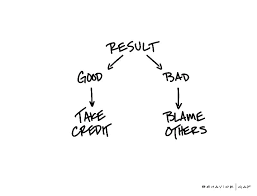8. The Self-Serving Bias
The self-serving bias is a tendency for people tend to give themselves credit for successes but lay the blame for failures on outside causes. When you do well on a project, you probably assume that it’s because you worked hard. But when things turn out badly, you are more likely to blame it on circumstances or bad luck.
The self-serving bias can be influenced by a variety of factors. Age and sex have been shown to play a part. Older people are more likely to take credit for their successes, while men are more likely to pin their failures on outside forces.
71
256 reads
CURATED FROM
IDEAS CURATED BY
Cognitive Biases
“
The idea is part of this collection:
Learn more about problemsolving with this collection
Conducting market research
Analyzing data to make informed decisions
Developing a product roadmap
Related collections
Similar ideas to 8. The Self-Serving Bias
Self-serving Bias
It causes you to claim your successes and ignore your failures.
This means that when something good happens, you take the credit, but when something bad happens, you blame it on external factors.
Self-serving bias may manifest at work when you receive critical feedback....
The self-serving bias
It encourages you to claim your successes and to deflect your failures.
When something good happens, you take the credit, but when something bad happens, you blame it on something out of your control.
6. Self-Serving Bias:
People attribute their successes to internal factors but attribute their failures to external factors. For instance, if you succeed in a project, you might credit your skills, but if you fail, you blame a lack of resources.
Read & Learn
20x Faster
without
deepstash
with
deepstash
with
deepstash
Personalized microlearning
—
100+ Learning Journeys
—
Access to 200,000+ ideas
—
Access to the mobile app
—
Unlimited idea saving
—
—
Unlimited history
—
—
Unlimited listening to ideas
—
—
Downloading & offline access
—
—
Supercharge your mind with one idea per day
Enter your email and spend 1 minute every day to learn something new.
I agree to receive email updates

